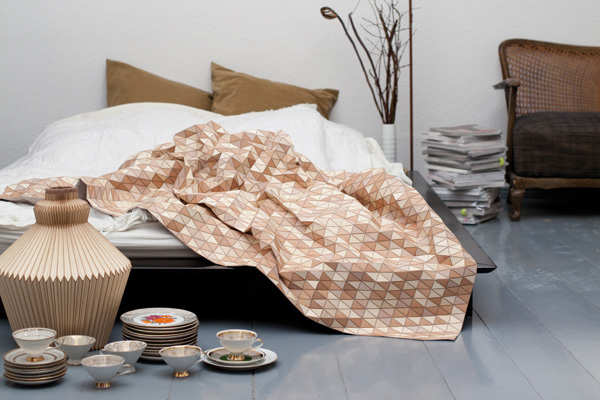In an attempt to create an innovation tactile experience, German textile designer Elisa Strozyk has created a collection of blankets, table cloths, rugs and bed covers made from her ‘Wooden Textile’. Strozyk has been researching ways to provide wood with textile properties in testing methods to make wood flexible and soft, or interweave textile elements. One of the processes to design a flexible wooden surface is its deconstruction into pieces, which are then attached to a textile base. The wood is cut by hand or laser cut, and all tiles are stuck by hand to compose a textile-like surface.
After spending months in R & D and experimenting with different types of wood, she decided to use wood veneer. The wood is cut by laser cut, and all tiles are stuck by hand to compose a textile-like surface.The slices of wood she uses are about 0.6 mm thick and very flexible, an essential property for her wooden textiles. But at the same time, there are some types of wood like oak that cannot be used due it’s brittle nature. Strozyk mostly worked with cherry and maple wood.
“The world around us is becoming increasingly immaterial. We are now used to write emails instead of letters, to pay online, to download music and touch virtual buttons on touch screens. We live in a society of images, a visual culture full of colours, advertisements, television and the internet. There is not much left to feel. Giving importance to surfaces that are desirable to touch can reconnect us with the material world and enhance the emotional value of an object.” – says Elisa Strozyk. She adds, “We are used to experience wood as a hard material; we know the feeling of walking across wooden floors, to touch a wooden tabletop or to feel the bark of a tree. But we usually don’t experience a wooden surface which can be manipulated by touch.”
The ‘Wooden Textile’ project is a very intelligent approach to responsible thinking concerning life cycles of products and inspires young designers to recycle waste materials rather than using up the resources.
Photography by Sebastian Neeb










